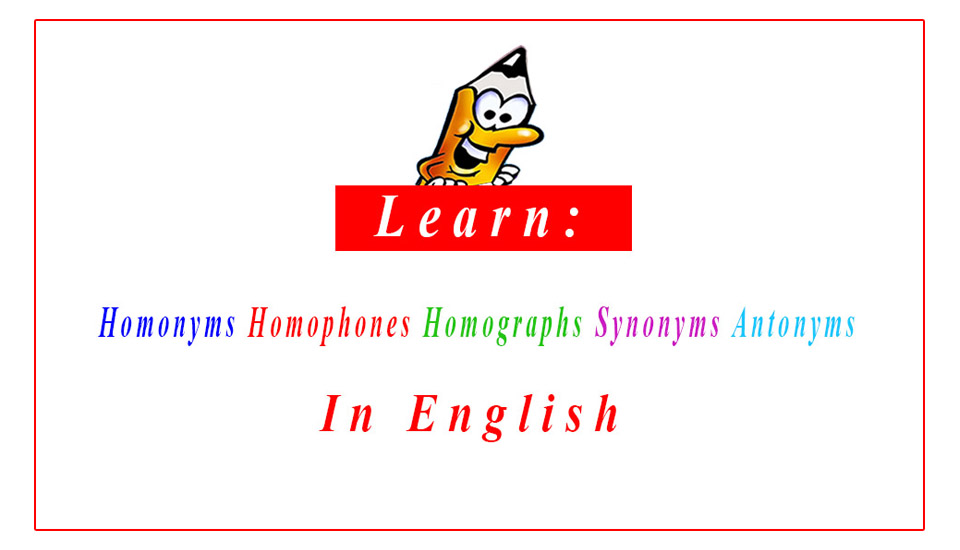Most of English words have homonyms, homophones, homographs, synonyms and antonyms. You can use your favorite meanwhile speaking and writing. In this article we are going to introduce: homonyms, homophones, homographs, synonyms and antonyms.
Homonyms, Homophones, Homographs, Synonyms And Antonyms
1. Homonyms
Homonyms are words that have the same pronunciation and spelling, but have different meanings.

- Bat (animal)
Bat (baseball object) - Can (be able)
Can (put something in container) - Ball (object)
Ball (dance)
2. Homographs/ Heteronyms
Homographs are words that have the same spelling, but different pronunciation and meaning, also called heteronyms.
- Live (living)
Live (of a broadcast) - Desert (land)
Desert (to leave) - Close (to shut)
Close (near)
Common English Homographs/ Heteronyms
Below you can see a list of homographs/ heteronyms which are confusing for ESL learners. Learn about them to avoid common errors in spoken and written form.
• Close => close: Adj (near) cloze: verb (shut)
• Live => live: verb (living) lie-ve: Adj (live broadcast)
• Alternate => al-ter-net: Noun (different option) al-ter-nate: verb (interchange, substitute)
• Content => con-tent: Noun (information) con-tent: Adj (satisfied)
• Desert => de-zert: Noun (dry land) de-zert: Verb (to leave)
• Dove => duv: Noun (bird) dove: Verb (past form of dive)
• Lead => leed: Verb (to direct) led: Noun (kind of iron)
• Minute => min-it: Noun (a period of time) my-nute: Adj (very small)
• Polish => pah-lish: N,V (brush) poh-lish: Adj (from Poland)
• Tear => teer: Noun (liquid from eye) tare: Verb (rip)
• Separate => sep-ret: Adj (different) Sep-a-rate: Verb (To divide)
The words above are the most common homographs that have the same spelling, but different pronunciation and different meaning. The words which are colored in blue show the pronunciation, we recommend you to check the pronunciation of those words once at dictionary.
3. Homophones
Homophones are words that have the same pronunciation, but have different spelling and meaning.
- Meet (to see)
Meat (the flesh of an animal) - Weak (not strong)
Week (a period of seven days) - See (to watch)
Sea (water)
Commonly Confused Homophones
- Affect vs. Effect => Affect (verb) Effect (noun)
- There vs. Their vs. they’re => There (location) Their (possessive) They’re (they are)
- You’re vs. Your => You’re (you are) Your (possessive)
Other Commonly Confused Homophones
- Accept/ except
- Allowed/ aloud
- Ant/aunt
- Ball/bawl
- Bear/bare
- Board/bored
- Brake/break
- By/bye/buy
- Capital/capitol
- Clothes/close
- Dear/deer
- Die/dye
- Fare/fair
- Flea/flee
- Hoarse/horse
- Idle/idol
- Its/it’s
- Knight/night
- Meet/meat
- No/know
- Pair/pare/pair
- Right/write
- Read/reed
- Scene/seen
- Sight/site/cite
- Tail/tale
- Raught/taut
- Threw/though
- Which/witch
- Loose/lose
- Principle/principal
- Weather/whether
Each pairs of words above have same pronunciation, but different meaning and different spelling.
4. Synonyms
Synonyms are words that are spelt and pronounced different but have the same or nearly the same meaning as another word.
- Big
Large - Correct
True - Near
Close
5. Antonyms
An antonym is a word that has opposite meaning of another word.
- Old
Young - White
Black - Boy
Girl
If you need high-quality writing assistance, get in touch with professional academic essay writing service advancedwriters.com


2 comments
Are there any heteronyms that are actually antonyms of each other? Because I seem to recall hearing about such a thing, but it was a long time ago and i forgot any details.
I do not know If they show what is it is called when same spelling and same pronunciation